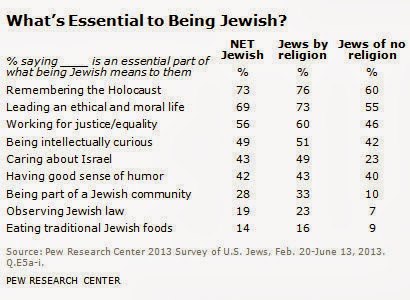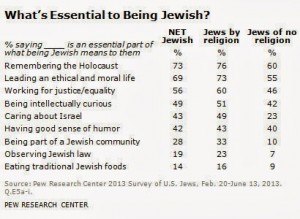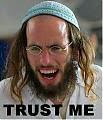Via Daily Stormer, Douglas Rushkoff: “the thing that makes judaism dangerous…”
The thing that makes judaism dangerous to everybody – to every race, to every nation, to every idea – is that we smash things that aren’t true. We don’t believe in the boundaries of nation states, we don’t believe in the ideas of these individual gods that protect individual groups of people, these are all artificial constructions and judaism really teaches us how to see that.
In a sense our detractors have us right, in that we are a corrosive force. We’re breaking down the false gods of all nations and all people because they’re not real, and that’s very upsetting to people.
Rushkoff’s brief observation calls to mind a similar expression of a similar attitude by Barbara Spectre. Both examples deserve to be better known, especially among those who are either ignorant of or deluded about the nature of jews and their views.
The revolutionary impulse is a long-term and well-established characteristic of jews. But then so is double-talk. When jews aren’t bragging about their thirst for destruction they’re denying it, trying instead to pin the blame on someone else. This duality is visible even in the very brief statements above, indicating just how closely related the two things are in jewish minds.
Jews imagine themselves victims as a way of justifying their aggression against others. It’s always and completely everybody else’s fault. Especially White people.
Douglas Rushkoff on returning to religious core values, from 2004, provides a more fleshed out version of this jewish rationale. Starting at 2:21:
Rushkoff: Well, understandably, after a couple of thousand years of persecution in Europe, and after the holocaust, alot of jewish attention went to wondering about how many jews are there, how many of us are left. And there’s sort of this mindset of looking at ourselves as an endangered species that needs to be protected. That kind of became a dominant theme in judaism.
And it’s understandable that that would happen. But the problem is that the obsession with numbers starts to make the prime jewish directives to fight assimilation, prevent intermarriage, you make sure your son marries a jewish girl so the children will be raised jewish, and the money is spent creating social forums where jews can meet new jews to make other jews. And you go to synagogue and you’ll hear the rabbi speaking about these issues of assimilation and protecting jewry.
And it’s not the most appealing face for a spiritual path. It’s not the most appealing invitation that you’re doing judaism in order to help judaism, rather than doing judaism in order to somehow make the world a better place. Which is a much more, it’s a more appealing notion, I mean from a marketer standpoint, it’s a more appealing notion, it’s a better sell. But it’s also, it’s a more jewish one.
Interviewer: You’ve even gone further though. You’ve said this whole notion that jews form a race or a people is a false assumption. Explain that.
Rushkoff: Yeah. It’s funny, the first person to talk about the Israeli people – am? Israel – in Torah, is the pharoah. Right? He’s the bad guy, and he’s doing it because he’s scared that these Israelites are gonna replicate too much and then not support him in a war.
The first people to talk about a jewish race were the Spanish during the Inquisition, because so many jews had converted to Catholicism they needed a new reason to hate them. So they said well it’s not their religion, it’s their blood, you know it’s always going to be there.
And finally it was Hilter basterdizing a bit of Carl Jung, who said that, well, the jews have this genetic memory, so even if they’re only 1/8th or 1/16th jewish eventually what’s going to come out of them is this anti-establishment, kind of anti-fascist, disrespect for the fatherland – so we better kill them.
The problem is that jews ended up accepting this as our truth. You know, that judaiasm which was really born to defy all of these boundary conditions, to defy the notion that, oh, you move to this country and have this religion and believe in that god – that that’s ludicrous.
You know, that there’s sort of this one god pervades everything, it doesn’t matter where you live, that race isn’t a real thing – as any geneticist today will tell you that race isn’t real – but no, it seems that just as the world is waking up from these obsolete notions of race and nation state, it seems that jews are clinging to it as our sense of meaning, that well we’re a people, we’re a race, and this is the aspect of judaism we have to defend. And it seems ironic to me because these obsolete notions are part of what judaism was born to dissolve.
One takeaway from my recent series of podcasts examining jewish identity is that the most central tenet of jewishness, at the heart of their “religion”, is their belief in themselves as a people. That belief is literally more important than any other, including any beliefs about god. But there’s more. The jews are not just a people. They are a parasitic people. They not only thrive at the expense of others, they are acutely aware of it.
This is the reason for their double-talk and denial, dissembling and dissimulation. Rushkoff supplies an excellent example here. He’s not just regurgitating someone else’s lines. He’s thought it through. What the interviewer mistakes as a critique of jewry and denial of peoplehood is actually the opposite. He’s offering an apology, advising and excusing jews while blaming other peoples.
Rushkoff’s main concern is that his people are making their peoplehood too obvious, and he doesn’t think this is good for them. He’s disdainful of other people’s religions, but favors the pretense that jewishness is about religion because he knows others buy it. Jews, he knows, know better.
To make sense of Rushkoff’s statements is to understand that he sees jewish smashing and corroding, dissolving and obsoleting as good and only good when it comes to smashing, corroding, dissolving and obsoleting other peoples and nations. In contrast, he cares about the jews and wants them to continue. He thinks that the best way for them to do it, amidst all the destruction and harm they’re wreaking on the nations and peoples around them, is to not flaunt their own nation state and peoplehood so openly.
“Our poison is wonderful!”, Rushkoff says about his people, to his people, “Let’s not forget how it works and who it’s for!”







